24 mar 2015
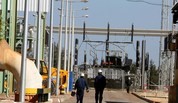
Municipalities in Gaza Strip said the increasing siege, power station closure and the increasing hours of power cut offs on irregular basis have negatively affected the work of municipalities in the blockaded enclave.
Gaza mayor Nizar Hijazi said, in a press conference he held with mayors of other municipalities in the besieged Gaza Strip on Tuesday, that the power cut offs resulted in the inability of running sewage plants and water wells efficiently.
This has led to a large imbalance in the regularity of facilities and to the stop of a large part of it, he added.
The mayor said the municipalities are not capable of making up for the continuous power cutoffs by running generators as generators’ fuel needs huge budgets which could not be provided because of the current bad economic conditions.
The mayors in Gaza asked Palestinian president Mahmoud Abbas to urgently intervene to put an end to this problem by issuing orders to Prime Minister Rami al-Hamdallah to shoulder his responsibility in Gaza.
They called on the Palestinian Authority and its unity government to remove the taxes imposed on the fuel of Electricity Distribution Company in Gaza in order to be able to work by the minimum extent.
The mayors as well asked for a budget allocated for municipalities in the Israeli-besieged enclave.
For its part, the municipality of Deir al-Balah warned of full stop of services if the power crisis continued.
Dozens of civil workers and figures of Deir al-Balah got gathered before the municipality’s courtyard waving slogans such as “It is my right to have electricity” and “Why is Gaza deprived of electricity?” The protestors asked Abbas and al-Hamdallah to solve the crisis.
60 thousand liters are needed monthly for running the wells and generators in Deir al-Balah, the mayor said.
Engineer Ahmad Tayeh warned of the shortage of water flow to Gaza outskirts and border areas due to power cut offs, noting that those areas were destroyed during last summer’s Israeli war on the besieged enclave.
Gaza mayor Nizar Hijazi said, in a press conference he held with mayors of other municipalities in the besieged Gaza Strip on Tuesday, that the power cut offs resulted in the inability of running sewage plants and water wells efficiently.
This has led to a large imbalance in the regularity of facilities and to the stop of a large part of it, he added.
The mayor said the municipalities are not capable of making up for the continuous power cutoffs by running generators as generators’ fuel needs huge budgets which could not be provided because of the current bad economic conditions.
The mayors in Gaza asked Palestinian president Mahmoud Abbas to urgently intervene to put an end to this problem by issuing orders to Prime Minister Rami al-Hamdallah to shoulder his responsibility in Gaza.
They called on the Palestinian Authority and its unity government to remove the taxes imposed on the fuel of Electricity Distribution Company in Gaza in order to be able to work by the minimum extent.
The mayors as well asked for a budget allocated for municipalities in the Israeli-besieged enclave.
For its part, the municipality of Deir al-Balah warned of full stop of services if the power crisis continued.
Dozens of civil workers and figures of Deir al-Balah got gathered before the municipality’s courtyard waving slogans such as “It is my right to have electricity” and “Why is Gaza deprived of electricity?” The protestors asked Abbas and al-Hamdallah to solve the crisis.
60 thousand liters are needed monthly for running the wells and generators in Deir al-Balah, the mayor said.
Engineer Ahmad Tayeh warned of the shortage of water flow to Gaza outskirts and border areas due to power cut offs, noting that those areas were destroyed during last summer’s Israeli war on the besieged enclave.
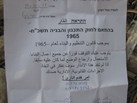
Israeli Occupation Forces (IOF) served demolition notices to two Palestinians to destroy their houses in al-Khalil claiming lack of construction permits.
Local sources told Quds Press the IOF ordered two brothers of Arafat family to demolish their homes in a town near al-Khalil, noting that the areas of both houses are 170 square meters each.
The sources pointed to the fact that this is the second time in which the IOF hands the town’s inhabitants demolition notices as they had earlier handed another man a destruction notification for his well.
Local sources told Quds Press the IOF ordered two brothers of Arafat family to demolish their homes in a town near al-Khalil, noting that the areas of both houses are 170 square meters each.
The sources pointed to the fact that this is the second time in which the IOF hands the town’s inhabitants demolition notices as they had earlier handed another man a destruction notification for his well.

Israeli soldiers, accompanied by armored bulldozers, invaded Tuesday Ta’nak village, west of the northern West Bank city of Jenin, and demolished a deep artesian well, in addition to uprooting ten Palestinian olive trees.
The Palestinian News & Info Agency (WAFA) said ten military vehicles, and an armored bulldozer invaded the village before demolishing a 50-meter deep artesian well.
The well provides water for agricultural lands belonging to residents of Ta’nak, Rommana, Zabbouba, Sielet al-Haretheyya, and al-Yamoun.
In addition, soldiers demolished a wall, and uprooted more than ten olive trees without providing any explanation for their attack.
The Palestinian News & Info Agency (WAFA) said ten military vehicles, and an armored bulldozer invaded the village before demolishing a 50-meter deep artesian well.
The well provides water for agricultural lands belonging to residents of Ta’nak, Rommana, Zabbouba, Sielet al-Haretheyya, and al-Yamoun.
In addition, soldiers demolished a wall, and uprooted more than ten olive trees without providing any explanation for their attack.
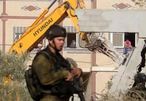
Israeli soldiers invaded, on Tuesday morning, the al-Koum Palestinian village, southwest of the southern West Bank city of Hebron, and handed orders for the destruction of two Palestinian homes, and a well.
The soldiers handed ‘Arafat Ahmad Rajoub, and his brother, Yasser, two orders to demolish their own homes in the village, and handed resident Mohammad Abdul-Hafith Rajoub an order to demolish his well.
Soldiers also invaded a number of neighborhoods in Hebron city, installed roadblocks on the main entrances of Sa’ir and Halhoul towns, and Hebron’s northern entrance, before stopping and searching dozens of cars, and investigated the ID cards of the passengers while interrogating them.
In addition, a number of Israeli fanatics of the Ramat Yeshai illegal colony, built on Palestinian lands in the center of Hebron, invaded the Jabal ar-Rahma area in the city, and conducted provocative acts.
The soldiers handed ‘Arafat Ahmad Rajoub, and his brother, Yasser, two orders to demolish their own homes in the village, and handed resident Mohammad Abdul-Hafith Rajoub an order to demolish his well.
Soldiers also invaded a number of neighborhoods in Hebron city, installed roadblocks on the main entrances of Sa’ir and Halhoul towns, and Hebron’s northern entrance, before stopping and searching dozens of cars, and investigated the ID cards of the passengers while interrogating them.
In addition, a number of Israeli fanatics of the Ramat Yeshai illegal colony, built on Palestinian lands in the center of Hebron, invaded the Jabal ar-Rahma area in the city, and conducted provocative acts.
23 mar 2015 World Water Day
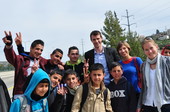
Flooded Walkways and Empty Taps: International and Palestinian representatives visit a vulnerable school in Area C on World Water Day 2015
To mark the occasion of World Water Day 2015, international and Palestinian representatives visited Al Tira School on Monday 23rd March to learn firsthand about the water challenges faced by schools and communities in Area C of the occupied West Bank. Water for sustainable development – the theme of this year’s World Water Day – is a far cry from the realities these communities face.
Al Tira School is a striking example of life under occupation: located next to Beit Horon settlement, the school is isolated by the Separation Wall on three sides and the Israeli-only highway Route 443 to the fourth. Further to these overwhelming pressures, the 200 students of Al Tira School cannot have safe and reliable access to water and sanitation due to Israeli policies in the occupied territory.
Representative from Denmark, France, Germany, Italy, and Egypt, together with the Ramallah Governor, and representatives of the Palestinian Water Authority and the Ministries of Education, Planning, Local Government, and Anti-Wall and Settlements participated in the event, which involved a tour of the school, briefings and speeches, and the unveiling of a mural painted at the school by a local artist to mark World Water Day.
“A visit like this to Al Tira School is important to understand the daily realities facing many Palestinians in the West Bank,” said Anders Tang Friborg, Representative of Denmark to the Palestinian Authority. “The average amount of water available to Palestinians per day is well below the World Health Organization’s (WHO) recommended minimum standard.”
The representatives learnt about unequal water resource sharing arrangements between Israelis and Palestinians and Israeli restrictions on infrastructure development in Area C. These policies leave Palestinians with an access to water that is inadequate for their needs and is four to five times less than the amount used by Israelis in Israel and in illegal settlements in the West Bank, such as Beit Horon.
The representatives ended their visit by accompanying students on their arduous daily walk home, which passes through a rainwater drain under Route 443 and alongside the busy highway. In stark contrast to the water shortages they face at school, students are often prevented from attending school during winter when the passage floods with rainwater.
Ayman Rabi, on behalf of EWASH, called upon international and Palestinian representatives to work together to find new solutions for equitable and sustainable water access for Palestinians: “Today we have gathered as representatives of the Palestinian government, the international community, and national NGOs to mark World Water Day. Let’s make sure this is more than just another event, another mark in our calendar. Let’s make this day mean something.”
The event was organized by the EWASH Advocacy Task Force, together with Secours Islamique France (SIF) and Gruppo di Volontariato Civile (GVC), two international humanitarian NGOs implementing water and sanitation projects in the occupied Palestinian territory.
To mark the occasion of World Water Day 2015, international and Palestinian representatives visited Al Tira School on Monday 23rd March to learn firsthand about the water challenges faced by schools and communities in Area C of the occupied West Bank. Water for sustainable development – the theme of this year’s World Water Day – is a far cry from the realities these communities face.
Al Tira School is a striking example of life under occupation: located next to Beit Horon settlement, the school is isolated by the Separation Wall on three sides and the Israeli-only highway Route 443 to the fourth. Further to these overwhelming pressures, the 200 students of Al Tira School cannot have safe and reliable access to water and sanitation due to Israeli policies in the occupied territory.
Representative from Denmark, France, Germany, Italy, and Egypt, together with the Ramallah Governor, and representatives of the Palestinian Water Authority and the Ministries of Education, Planning, Local Government, and Anti-Wall and Settlements participated in the event, which involved a tour of the school, briefings and speeches, and the unveiling of a mural painted at the school by a local artist to mark World Water Day.
“A visit like this to Al Tira School is important to understand the daily realities facing many Palestinians in the West Bank,” said Anders Tang Friborg, Representative of Denmark to the Palestinian Authority. “The average amount of water available to Palestinians per day is well below the World Health Organization’s (WHO) recommended minimum standard.”
The representatives learnt about unequal water resource sharing arrangements between Israelis and Palestinians and Israeli restrictions on infrastructure development in Area C. These policies leave Palestinians with an access to water that is inadequate for their needs and is four to five times less than the amount used by Israelis in Israel and in illegal settlements in the West Bank, such as Beit Horon.
The representatives ended their visit by accompanying students on their arduous daily walk home, which passes through a rainwater drain under Route 443 and alongside the busy highway. In stark contrast to the water shortages they face at school, students are often prevented from attending school during winter when the passage floods with rainwater.
Ayman Rabi, on behalf of EWASH, called upon international and Palestinian representatives to work together to find new solutions for equitable and sustainable water access for Palestinians: “Today we have gathered as representatives of the Palestinian government, the international community, and national NGOs to mark World Water Day. Let’s make sure this is more than just another event, another mark in our calendar. Let’s make this day mean something.”
The event was organized by the EWASH Advocacy Task Force, together with Secours Islamique France (SIF) and Gruppo di Volontariato Civile (GVC), two international humanitarian NGOs implementing water and sanitation projects in the occupied Palestinian territory.
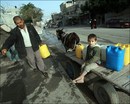
A Palestinian statistical report clearly showed unfair distribution of shares of aquifers in the West Bank in comparison between the Israeli settlers and the Palestinian natives.
The report, issued by the Palestinian Central Bureau of Statistics (PCBS) on March 22, which marks the World Water Day, showed that the Israeli daily share per capita of water consumption reached seven times higher than the Palestinians.
Palestinian water resources are fully controlled by Israel, according to the provisions enshrined in the Oslo Accords. According to some estimates, Israel is using more than 85 percent of the water in the West Bank, covering around a quarter of its own needs.
The water that remains in the occupied West Bank suffers from poor quality, the PCBS said.
In the Gaza Strip, more than 90% of the water pumped from the coastal aquifer does not meet the water quality standards of the World Health Organization, according to the report.
The water quality in the blockaded Gaza Strip is worse when compared to the West Bank. Only 5.8 percent of Gazans expressed satisfaction with quality and quantity of water in a survey conducted in 2013. In the West Bank that number stood at 73.5 percent, the PCBS said.
The report attributed the low percentage in Gaza to high salinity in the water due to sea water leakage into the aquifer as a result of over pumping; in addition to wastewater leakage into the aquifer, and the lack of clear mechanisms of controlling and monitoring drinking water by local authorities in Gaza.
The lasting blockade of the Gaza Strip and last summer’s Israeli aggression on it caused severe damage to the water supply infrastructure in the beleaguered enclave.
The development of the sector highly depends on external financing, which is highly problematic because of the Israeli-imposed blockade.
Additionally, the PCBS said that Israel deprives Palestinians of their right to an estimated 250 mcm annual extract from the Jordan River since 1967.
The report, issued by the Palestinian Central Bureau of Statistics (PCBS) on March 22, which marks the World Water Day, showed that the Israeli daily share per capita of water consumption reached seven times higher than the Palestinians.
Palestinian water resources are fully controlled by Israel, according to the provisions enshrined in the Oslo Accords. According to some estimates, Israel is using more than 85 percent of the water in the West Bank, covering around a quarter of its own needs.
The water that remains in the occupied West Bank suffers from poor quality, the PCBS said.
In the Gaza Strip, more than 90% of the water pumped from the coastal aquifer does not meet the water quality standards of the World Health Organization, according to the report.
The water quality in the blockaded Gaza Strip is worse when compared to the West Bank. Only 5.8 percent of Gazans expressed satisfaction with quality and quantity of water in a survey conducted in 2013. In the West Bank that number stood at 73.5 percent, the PCBS said.
The report attributed the low percentage in Gaza to high salinity in the water due to sea water leakage into the aquifer as a result of over pumping; in addition to wastewater leakage into the aquifer, and the lack of clear mechanisms of controlling and monitoring drinking water by local authorities in Gaza.
The lasting blockade of the Gaza Strip and last summer’s Israeli aggression on it caused severe damage to the water supply infrastructure in the beleaguered enclave.
The development of the sector highly depends on external financing, which is highly problematic because of the Israeli-imposed blockade.
Additionally, the PCBS said that Israel deprives Palestinians of their right to an estimated 250 mcm annual extract from the Jordan River since 1967.
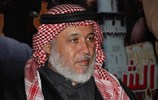
Palestinian lawmaker Marwan Abu Ras has appealed to the concerned international and local institutions to urgently intervene to prevent the deterioration of the water situation in occupied Palestine, especially in the Gaza Strip.
MP Abu Ras, rapporteur of the parliamentary committee on interior affairs and local government, made his appeal during a news conference held on Sunday in the Gaza Strip by the water authority on the occasion of the world water day.
The lawmaker accused Israel of stealing water from the Palestinian aquifers and seizing about one billion cubic meters per year, affirming that the Palestinians have access to only five percent of their groundwater every year.
He added that about 55 million cubic meters of water are sold annually for one dollar per cubic meter by the Israeli occupation authority to the Palestinians, while the Jewish settlers' share of water in the West Bank is seven-fold.
Abu Ras also pointed out that the salinity rates in the coastal aquifer of Gaza reached unprecedented levels and made its water unsuitable for human use, warning that this problem has serious impacts on the health of the population and the environment in the besieged enclave.
He emphasized the importance of effectively using the media and mosques to raise the awareness of citizens about the need to rationalize water consumption to prevent its depletion in Gaza.
MP Abu Ras, rapporteur of the parliamentary committee on interior affairs and local government, made his appeal during a news conference held on Sunday in the Gaza Strip by the water authority on the occasion of the world water day.
The lawmaker accused Israel of stealing water from the Palestinian aquifers and seizing about one billion cubic meters per year, affirming that the Palestinians have access to only five percent of their groundwater every year.
He added that about 55 million cubic meters of water are sold annually for one dollar per cubic meter by the Israeli occupation authority to the Palestinians, while the Jewish settlers' share of water in the West Bank is seven-fold.
Abu Ras also pointed out that the salinity rates in the coastal aquifer of Gaza reached unprecedented levels and made its water unsuitable for human use, warning that this problem has serious impacts on the health of the population and the environment in the besieged enclave.
He emphasized the importance of effectively using the media and mosques to raise the awareness of citizens about the need to rationalize water consumption to prevent its depletion in Gaza.
4 mar 2015

A political battle to install a water pipeline for the first planned Palestinian city of Rawabi is now over, with Palestinian American entrepeneur finally able to reach his goal of establishing a beautiful city in area A of the West Bank.
Bashar al-Masri, a Palestinian American entrepreneur, has finally followed-through with his vision to fully plan a Palestinian city from its initiation, in the city of Rawabi – located in area A in the West Bank.
Seven years after announcing his plan to build the first Palestinian planned city, five years after gathering enough investments from princesses in Qatar and hundreds of workers dug its foundations and two years after thousands of apartments were sold on the Palestinian hill that overlooks Ramallah, al-Masri’s dream finally came true.
“I’m satisfied,” al-Masri said in an interview with Yedioth Ahronoth, “and I’m not crying over the political and bureaucratic milk that was spilled during the long journey.”
With the declaration of the development of the first Palestinian planned city, al-Masri was the subject of much criticism from both the Israelis and the Palestinians.
The Palestinians blamed al-Masri for “normalization” when they found out he was purchasing pavement from an Israeli company, Akerstein, and materials such as electrical equipment from Israel.
On the Israeli side, right-wing members claimed he was “invading” Israeli territory and that Rawabi would be used as a base for terrorists.
Bashar al-Masri, a Palestinian American entrepreneur, has finally followed-through with his vision to fully plan a Palestinian city from its initiation, in the city of Rawabi – located in area A in the West Bank.
Seven years after announcing his plan to build the first Palestinian planned city, five years after gathering enough investments from princesses in Qatar and hundreds of workers dug its foundations and two years after thousands of apartments were sold on the Palestinian hill that overlooks Ramallah, al-Masri’s dream finally came true.
“I’m satisfied,” al-Masri said in an interview with Yedioth Ahronoth, “and I’m not crying over the political and bureaucratic milk that was spilled during the long journey.”
With the declaration of the development of the first Palestinian planned city, al-Masri was the subject of much criticism from both the Israelis and the Palestinians.
The Palestinians blamed al-Masri for “normalization” when they found out he was purchasing pavement from an Israeli company, Akerstein, and materials such as electrical equipment from Israel.
On the Israeli side, right-wing members claimed he was “invading” Israeli territory and that Rawabi would be used as a base for terrorists.

But ultimately, against all odds, al-Masri was able to see his vision through.
Last Thursday, al-Masri was notified by Israeli media that Israel would be lifting its long held opposition and would approve the transfer of a water pipe to Rawabi. In doing so, Israel has lifted the last block on the way to populating the city.
“I immediately called Yoav (coordinator of government activities in the territories) and he said to me: ‘Mabrouk, you have water,’” said al-Masri.
“I ask if all the opposition was lifted from the Israeli ministers and he said: ‘This is Prime Minister Netanyahu’s decision and no one can object it any longer.’”
The US government and the leaders of US Jewish organizations, who have visited Rawabi in the past, blessed Netanyahu’s decision to lift the ban against the water pipe that delayed the populating of the city.
“We are now beginning to set up the pipe and the first group of residents will begin to settle there in May,” said al-Masri. “There is still a lot of work to be done in the field. Because of the political and economic situation in the territories, it does not seem fit to us to carry out a celebration for the groundbreaking of the city. In the middle of May will carry out a special event, and whoever wants to come is invited – including Israelis.
In the first phase, 639 Palestinian families who bought apartments as part of the project will move in – they received apology letters for the delays which were caused by problems with the road leading to the city, political opposition from the Israeli side and problems dealing with the water pipe.
“I’m really happy that everything is already behind me,” said al-Masri. “I certainly invited Israelis to visit Rawabi to see how a Palestinian city is built and how high-level housing is offered. We also deserve to live in a beautiful city like the cities I’ve seen in Israel, no?”
Last Thursday, al-Masri was notified by Israeli media that Israel would be lifting its long held opposition and would approve the transfer of a water pipe to Rawabi. In doing so, Israel has lifted the last block on the way to populating the city.
“I immediately called Yoav (coordinator of government activities in the territories) and he said to me: ‘Mabrouk, you have water,’” said al-Masri.
“I ask if all the opposition was lifted from the Israeli ministers and he said: ‘This is Prime Minister Netanyahu’s decision and no one can object it any longer.’”
The US government and the leaders of US Jewish organizations, who have visited Rawabi in the past, blessed Netanyahu’s decision to lift the ban against the water pipe that delayed the populating of the city.
“We are now beginning to set up the pipe and the first group of residents will begin to settle there in May,” said al-Masri. “There is still a lot of work to be done in the field. Because of the political and economic situation in the territories, it does not seem fit to us to carry out a celebration for the groundbreaking of the city. In the middle of May will carry out a special event, and whoever wants to come is invited – including Israelis.
In the first phase, 639 Palestinian families who bought apartments as part of the project will move in – they received apology letters for the delays which were caused by problems with the road leading to the city, political opposition from the Israeli side and problems dealing with the water pipe.
“I’m really happy that everything is already behind me,” said al-Masri. “I certainly invited Israelis to visit Rawabi to see how a Palestinian city is built and how high-level housing is offered. We also deserve to live in a beautiful city like the cities I’ve seen in Israel, no?”
28 feb 2015
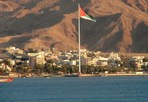
Egyptian strategist Adel Suleiman has warned that the Dead Sea canal project between Jordan and Israel would torpedo the Palestinian cause entirely.
Suleiman, head of the International Center for Future and Strategic Studies, stated on his Twitter page that this project would liquidate the Palestinian cause forever and give Israel a chance to control a lifeline to Jordan and the West Bank.
He said the executive agreement of the canal project would link the interests of Jordan, Israel and Palestine together in the framework of regional arrangements for a new Middle East.
Jordan and Israel on Wednesday signed a cooperation agreement to build a desalination plant in the Gulf of Aqaba and a pipeline linking the Red Sea with the Dead Sea.
Regardless of its threat to the Palestinian cause, the Jordanians believe the agreement with Israel is important to provide their country with a source of fresh water and save it from its severe water crisis, and also to revive the receding Dead Sea.
Suleiman, head of the International Center for Future and Strategic Studies, stated on his Twitter page that this project would liquidate the Palestinian cause forever and give Israel a chance to control a lifeline to Jordan and the West Bank.
He said the executive agreement of the canal project would link the interests of Jordan, Israel and Palestine together in the framework of regional arrangements for a new Middle East.
Jordan and Israel on Wednesday signed a cooperation agreement to build a desalination plant in the Gulf of Aqaba and a pipeline linking the Red Sea with the Dead Sea.
Regardless of its threat to the Palestinian cause, the Jordanians believe the agreement with Israel is important to provide their country with a source of fresh water and save it from its severe water crisis, and also to revive the receding Dead Sea.
4 feb 2015

Israeli Occupation Forces (IOF) distributed demolition notices to Palestinians notifying them of destroying water wells in lands of Silwad village near Ramallah.
Deputy Chief of the council of Silwad Agricultural Cooperation Society, Abdurrahman Hammad, told the PIC reporter the IOF notified four Palestinian farmers of destroying wells they use for agricultural purposes. The IOF also summoned the men to attend a trial hearing in Beit Eil court on February 12, 2015.
Hammad said these wells have been established within a project implemented by the Agricultural Relief Company and funded by the European Union.
Deputy Chief of the council of Silwad Agricultural Cooperation Society, Abdurrahman Hammad, told the PIC reporter the IOF notified four Palestinian farmers of destroying wells they use for agricultural purposes. The IOF also summoned the men to attend a trial hearing in Beit Eil court on February 12, 2015.
Hammad said these wells have been established within a project implemented by the Agricultural Relief Company and funded by the European Union.
29 jan 2015

Israeli bulldozers, on Thursday, destroyed a water pipe being used in connecting the West Tubas district's Atoof village with Khirbet Yezra, in the northern Jordan Valley.
Head of Al-Maleh local council, Aaref Daraghmeh, said that the pipe had length of 1,000 meters, and was donated by Agricultural Relief to provide the residents of Yezra with water, since the area has no water sources.
According to the PNN, Dr. Hanna Issa, professor and expert on international law, strongly condemned the action, saying that occupation authorities provide settlers with water, while depriving Palestinians of their own sources.
Settlers in the occupied West Bank reportedly get an unlimited supply of water amounting to about four times more than Palestinians' consumption of water.
Issa added that occupation authorities consume about 80% of the mutual water wells, despite the fact that 80-95% of them are located in Palestinian areas, pointing out that this is water theft, and in contravention of international law.
Issa also stressed that Israel has continuously implemented a policy of displacing Palestinians, separating them from homes near water sources.
Israel also prevents Palestinians from digging wells without military permission, while giving privilege to all illegal settlers.
Issa reiterated that Israel was an occupying power and had no sovereignty to tamper with water sources, according to the fourth Geneva convention.
He also demanded Israeli withdrawal from Palestinian land, according to UN Resolution 242 (1967) and Resolution 338 (1973).
Head of Al-Maleh local council, Aaref Daraghmeh, said that the pipe had length of 1,000 meters, and was donated by Agricultural Relief to provide the residents of Yezra with water, since the area has no water sources.
According to the PNN, Dr. Hanna Issa, professor and expert on international law, strongly condemned the action, saying that occupation authorities provide settlers with water, while depriving Palestinians of their own sources.
Settlers in the occupied West Bank reportedly get an unlimited supply of water amounting to about four times more than Palestinians' consumption of water.
Issa added that occupation authorities consume about 80% of the mutual water wells, despite the fact that 80-95% of them are located in Palestinian areas, pointing out that this is water theft, and in contravention of international law.
Issa also stressed that Israel has continuously implemented a policy of displacing Palestinians, separating them from homes near water sources.
Israel also prevents Palestinians from digging wells without military permission, while giving privilege to all illegal settlers.
Issa reiterated that Israel was an occupying power and had no sovereignty to tamper with water sources, according to the fourth Geneva convention.
He also demanded Israeli withdrawal from Palestinian land, according to UN Resolution 242 (1967) and Resolution 338 (1973).
25 jan 2015
|
|
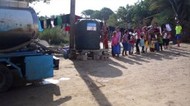
The film maker, Celia Peterson, has released a new short film exploring the water crisis in Gaza.
The video, made in cooperation with the Thirsting for Justice Campaign, shows how the Israeli blockade is causing the contamination and collapse of Gaza’s only natural water resource, the Coastal Aquifer. On current trends the UN predicts that the Aquifer will be unfit for human consumption by as early as 2016. Watch the video here and please sign our petition here to put pressure on European governments to hold Israel to account. |
22 jan 2015
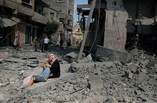
Austria confirmed Wednesday its efforts to provide all necessary needs of the Palestinian people especially in Gaza Strip.
Austria’s representative to the Palestinian Authority Andrea Nasi visited yesterday a number of water facilities in Gaza in light of the accurate water crisis witnessed by the besieged Strip.
Vice President of the Palestinian Water Authority Rebhi Sheikh has briefed the Austrian diplomat about the problems faced by the water authority.
Both the Palestinian and Austrian officials discussed ways to reduce water crisis implications on the people of the Strip.
In this matter, Sheikh expressed gratitude to the Austrian government for its continued efforts in favor of water projects in Gaza Strip.
Meanwhile, a Swiss diplomatic delegation, headed by the Swiss deputy ambassador to the Palestinian Authority Jonas Ghaith, met on Wednesday the undersecretary of Finance Ministry in Gaza Yusuf Kayali over the Palestinian funds allocated for Gaza in 2015.
Both parties have discussed during the meeting the Gaza-based ministries' difficulties in acquiring funds for operating expenses in Gaza Strip as they are not included in the 2015 budget.
Switzerland plays an important role to integrate Gaza former government’s civil servants along with the PA employees after PA’s rejection to pay their salaries over the past six months.
Austria’s representative to the Palestinian Authority Andrea Nasi visited yesterday a number of water facilities in Gaza in light of the accurate water crisis witnessed by the besieged Strip.
Vice President of the Palestinian Water Authority Rebhi Sheikh has briefed the Austrian diplomat about the problems faced by the water authority.
Both the Palestinian and Austrian officials discussed ways to reduce water crisis implications on the people of the Strip.
In this matter, Sheikh expressed gratitude to the Austrian government for its continued efforts in favor of water projects in Gaza Strip.
Meanwhile, a Swiss diplomatic delegation, headed by the Swiss deputy ambassador to the Palestinian Authority Jonas Ghaith, met on Wednesday the undersecretary of Finance Ministry in Gaza Yusuf Kayali over the Palestinian funds allocated for Gaza in 2015.
Both parties have discussed during the meeting the Gaza-based ministries' difficulties in acquiring funds for operating expenses in Gaza Strip as they are not included in the 2015 budget.
Switzerland plays an important role to integrate Gaza former government’s civil servants along with the PA employees after PA’s rejection to pay their salaries over the past six months.
11 jan 2015
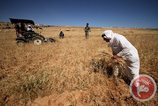
Representatives of the Dutch government recently visited a number of villages in the Hebron region as part of project focused on expanding Palestinian farmers' access to land through improved management of water resources.
The project, entitled "Land and Water Resource Management for Agriculture Development in the West Bank," is slated to last three-and-a-half years and is being implemented in 46 areas across the West Bank with the support of a number of Palestinian organizations.
During the recent visit, the First Secretary of Economic Affairs at the Netherlands Representative Office in Palestine, Wijnand Marchal, met with local stakeholders, beneficiaries, and members of regional committees and councils in Halhul, al-Shuyukh, Bani Naim, and al-Dhahiriya, all villages in the Hebron region.
There, the secretary reviewed a number of ongoing projects, including a land reclamation project over 1,500 dunums (370 acres), the opening of 150 kilometers (93 miles) of agricultural roads, and 1,100 dunums (270 acres) of water harvesting and deep rooting techniques, among others.
"The Netherlands government is pleased to provide this support and will be happy to come back later and see the fruit of their support to the Palestinian farmers," Marchal was quoted as saying in a statement.
The local projects are part of a larger strategy to "improve the food security and reduce poverty in vulnerable rural areas through comprehensive development of available agricultural sources including land, water and human capacity," the statement continued.
The project is slated enhance water supplies and irrigation water use "through installing water networks and constructing steel balance water tanks," the statement added, noting that the project will also "empower women to enhance their involvement in land development and agriculture and ease their access to inheritance law and rights."
The project will develop 3,000 dunums (740 acres) of unused land through the construction of 59 communal cisterns, helping farmers irrigate areas that were not previously arable.
The opening of agricultural roads, meanwhile, will improve access to the areas for Palestinians, who are in many cases forbidden from using the network of well-developed Israeli settler roads that crisscross the West Bank, particularly in rural areas around settlements.
The development of unused agricultural lands available to local Palestinian farmers fills a particularly urgent need as land that sits unused for more than a few years is often confiscated by Israeli authorities for the construction of Jewish-only settlements.
Access to areas around these settlements, in turn, are increasingly limited to Palestinians, often leaving farmers destitute as they are progressively forced to give up chunks of their lands.
By providing resources to Palestinian farmers to improve their ability to irrigate and farm lands currently fallow, however, the project could potentially block such appropriations, or at least make them more difficult to justify.
The senior project manager of the project, Mohammad Awad, said in the statement that the project would directly benefit 13,301 people and indirectly benefit 154,357, reducing levels of poverty among West Bank farmers.
The main local partners in the project are the Union of Agricultural Work Committees as well as the Palestinian Hydrology Group, Land Research Center, and Economic and Social Development Center.
The project, entitled "Land and Water Resource Management for Agriculture Development in the West Bank," is slated to last three-and-a-half years and is being implemented in 46 areas across the West Bank with the support of a number of Palestinian organizations.
During the recent visit, the First Secretary of Economic Affairs at the Netherlands Representative Office in Palestine, Wijnand Marchal, met with local stakeholders, beneficiaries, and members of regional committees and councils in Halhul, al-Shuyukh, Bani Naim, and al-Dhahiriya, all villages in the Hebron region.
There, the secretary reviewed a number of ongoing projects, including a land reclamation project over 1,500 dunums (370 acres), the opening of 150 kilometers (93 miles) of agricultural roads, and 1,100 dunums (270 acres) of water harvesting and deep rooting techniques, among others.
"The Netherlands government is pleased to provide this support and will be happy to come back later and see the fruit of their support to the Palestinian farmers," Marchal was quoted as saying in a statement.
The local projects are part of a larger strategy to "improve the food security and reduce poverty in vulnerable rural areas through comprehensive development of available agricultural sources including land, water and human capacity," the statement continued.
The project is slated enhance water supplies and irrigation water use "through installing water networks and constructing steel balance water tanks," the statement added, noting that the project will also "empower women to enhance their involvement in land development and agriculture and ease their access to inheritance law and rights."
The project will develop 3,000 dunums (740 acres) of unused land through the construction of 59 communal cisterns, helping farmers irrigate areas that were not previously arable.
The opening of agricultural roads, meanwhile, will improve access to the areas for Palestinians, who are in many cases forbidden from using the network of well-developed Israeli settler roads that crisscross the West Bank, particularly in rural areas around settlements.
The development of unused agricultural lands available to local Palestinian farmers fills a particularly urgent need as land that sits unused for more than a few years is often confiscated by Israeli authorities for the construction of Jewish-only settlements.
Access to areas around these settlements, in turn, are increasingly limited to Palestinians, often leaving farmers destitute as they are progressively forced to give up chunks of their lands.
By providing resources to Palestinian farmers to improve their ability to irrigate and farm lands currently fallow, however, the project could potentially block such appropriations, or at least make them more difficult to justify.
The senior project manager of the project, Mohammad Awad, said in the statement that the project would directly benefit 13,301 people and indirectly benefit 154,357, reducing levels of poverty among West Bank farmers.
The main local partners in the project are the Union of Agricultural Work Committees as well as the Palestinian Hydrology Group, Land Research Center, and Economic and Social Development Center.
7 jan 2015

95% of the groundwater in the blockaded Gaza Strip is unfit for human consumption, a report recently issued by the Palestinian Water Authority revealed.
A report issued by the water authority found out that the overall potable water consumption in Gaza reached 103.34 million cubic meters in 2013, equivalent to about 90 liters per capita, noting that the quantity and quality of water consumed is inadequate and lower than the recommended global rates.
It warned that the water conditions in Gaza have remarkably gone downhill due to the limited capacity of the underground water, estimated at 55 to 60 million cubic meters annually, while the quantity of water needed in Gaza is estimated at about 200 million cubic meters per annum.
The report further pointed out that the continued extraction of groundwater caused an increase in its salinity, fanning the flames of a crisis already exacerbated by the increasing contamination of the underground reservoir ratios as a result of the sewage leak.
A total of 98% of water resources in the Strip comes from coastal underground water, while the remainder needs are covered from the limited quantities purchased from the Israeli Mekorot water company.
A report issued by the water authority found out that the overall potable water consumption in Gaza reached 103.34 million cubic meters in 2013, equivalent to about 90 liters per capita, noting that the quantity and quality of water consumed is inadequate and lower than the recommended global rates.
It warned that the water conditions in Gaza have remarkably gone downhill due to the limited capacity of the underground water, estimated at 55 to 60 million cubic meters annually, while the quantity of water needed in Gaza is estimated at about 200 million cubic meters per annum.
The report further pointed out that the continued extraction of groundwater caused an increase in its salinity, fanning the flames of a crisis already exacerbated by the increasing contamination of the underground reservoir ratios as a result of the sewage leak.
A total of 98% of water resources in the Strip comes from coastal underground water, while the remainder needs are covered from the limited quantities purchased from the Israeli Mekorot water company.
Page: 2 - 1
